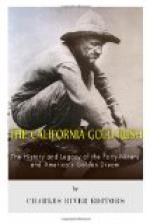The prisoners, Casey and Cora, had expected, when taken from the jail, to be lynched at once. But, since the execution had been thus long postponed, they began to take heart. They understood that they were to have a clear trial “according to law”—a phrase which was in those days immensely cheering to malefactors. They were not entirely cut off from outside communication. Casey was allowed to see several men on pressing business, and permitted to talk to them freely, although before a witness from the Committee. Cora received visits from Belle Cora, who in the past had spent thousands on his legal defense. Now she came to see him faithfully and reported every effort that was being made.
On Tuesday, the 20th, Cora was brought before the Committee. He asked for counsel, and Truett was appointed to act for him. A list of witnesses demanded by Cora was at once summoned, and a sub-committee was sent to bring them before the board of trial. All the ordinary forms of law were closely followed, and all the essential facts were separately brought out. It was the same old Cora trial over again with one modification; namely, that all technicalities and technical delays were eliminated. Not an attempt was made to confine the investigation to the technical trial. By dusk the case for the prosecution was finished, and that for the defense was supposed to begin.
During all this long interim the Executive Committee had sat in continuous session. They had agreed that no recess of more than thirty minutes should be taken until a decision had been reached. But of all the long list of witnesses submitted by Cora for the defense not one could be found. They were in hiding and afraid. The former perjurers would not appear.
It was now falling dusk. The corners of the great room were in darkness. Beneath the elevated desk, behind which sat Coleman, Bluxome, the secretary, lighted a single oil lamp, the better to see his notes. In the interest of the proceedings a general illumination had not been ordered. Within the shadow, the door opened and Charles Doane, the Grand Marshal of the Vigilantes, advanced three steps into the room.
“Mr. President,” he said clearly, “I am instructed to announce that James King of William is dead.”
The conviction of both men took place that night, and the execution was ordered, but in secret.
Thursday noon had been set for the funeral of James King of William. This ceremony was to take place in the Unitarian church. A great multitude had gathered to attend. The church was filled to overflowing early in the day. But thousands of people thronged the streets round about, and stood patiently and seriously to do the man honor. Historians of the time detail the names of many marching bodies from every guild and society in the new city. Hundreds of horsemen, carriages, and foot marchers got themselves quietly into the line. They also were excluded from the funeral ceremonies by lack of room, but wished to do honor to the cortege. This procession is said to have been over two miles in length. Each man wore a band of crepe around his left arm. All the city seemed to be gathered there. And yet the time for the actual funeral ceremony was still some hours distant.




